Unit 1 This is me-Period 1 Comic strip & Welcome to the unit 课件(共36张PPT,内嵌音频)
文档属性
| 名称 | Unit 1 This is me-Period 1 Comic strip & Welcome to the unit 课件(共36张PPT,内嵌音频) |
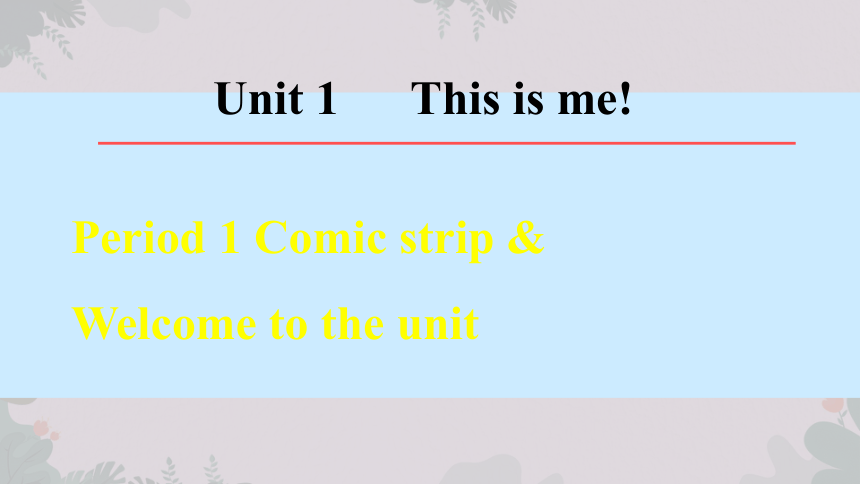
|
|
| 格式 | pptx | ||
| 文件大小 | 4.4MB | ||
| 资源类型 | 教案 | ||
| 版本资源 | 牛津译林版 | ||
| 科目 | 英语 | ||
| 更新时间 | 2024-03-03 17:09:10 | ||
图片预览


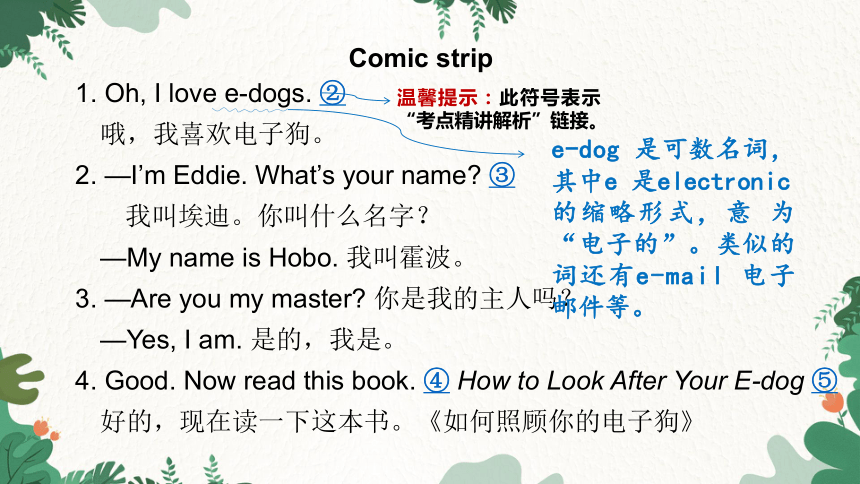


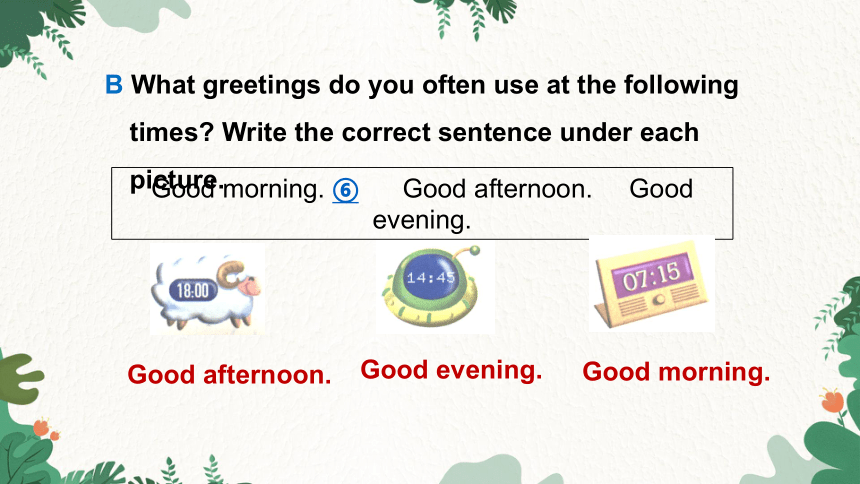
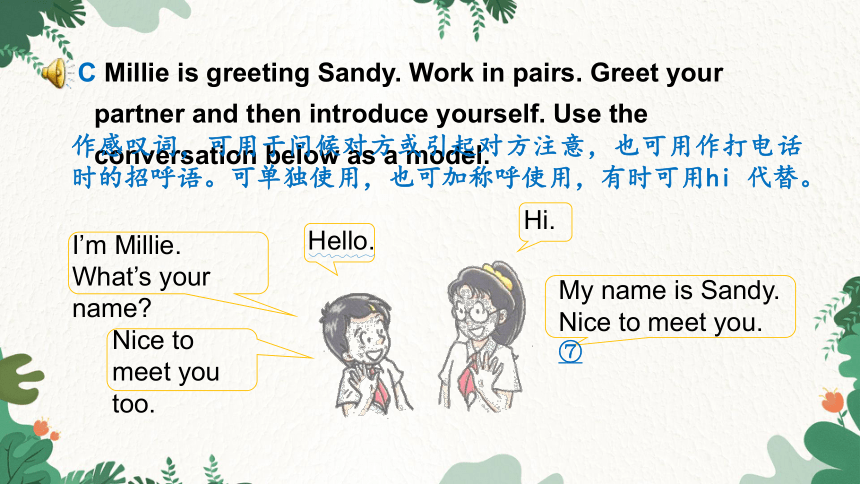
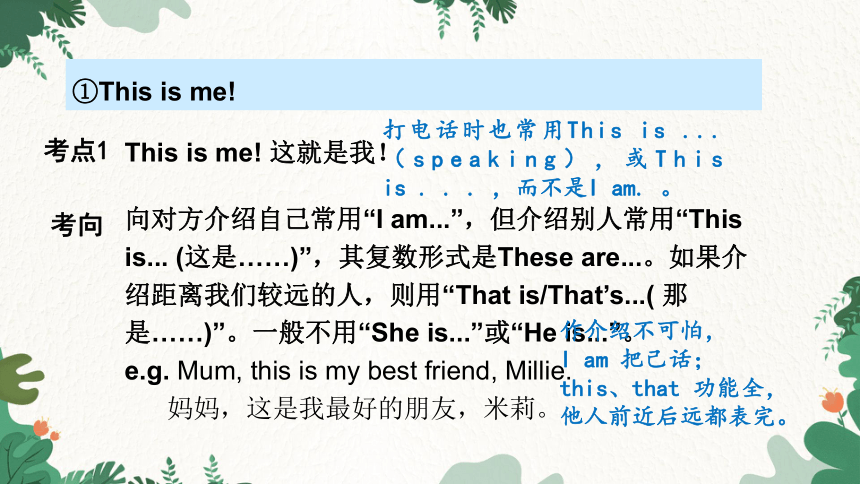
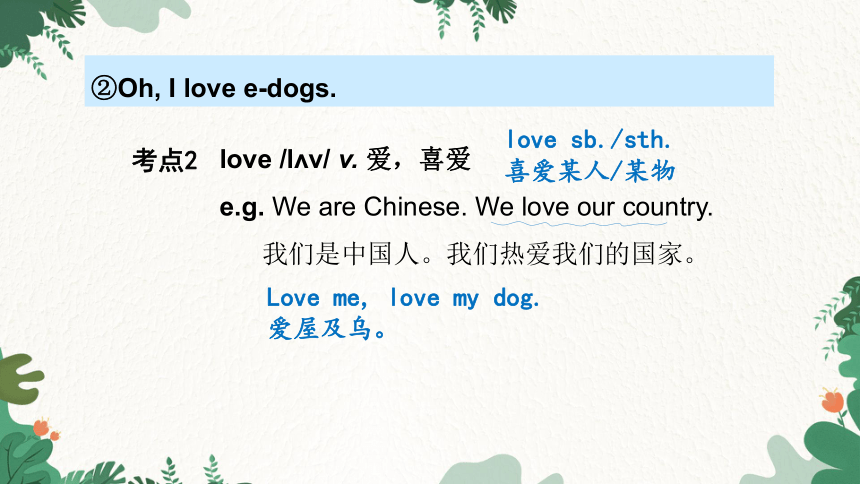
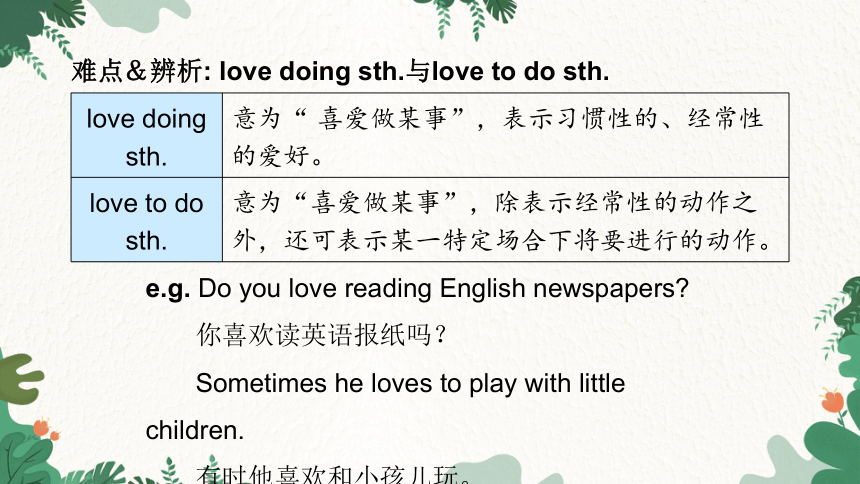
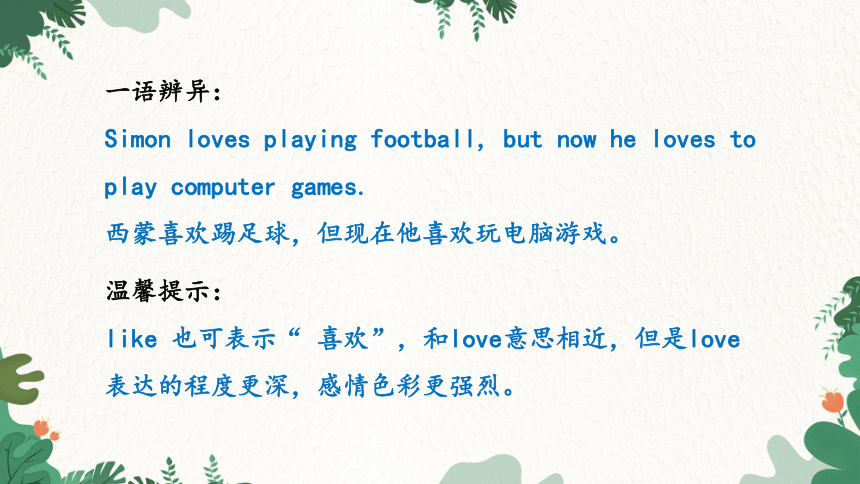

文档简介
(共36张PPT)
Period 1 Comic strip & Welcome to the unit
Unit 1 This is me!
Can you introduce yourself to your new classmates
Comic strip
1. Oh, I love e-dogs. ②
哦,我喜欢电子狗。
2. —I’m Eddie. What’s your name ③
我叫埃迪。你叫什么名字?
—My name is Hobo. 我叫霍波。
3. —Are you my master 你是我的主人吗?
—Yes, I am. 是的,我是。
4. Good. Now read this book. ④ How to Look After Your E-dog ⑤
好的,现在读一下这本书。《如何照顾你的电子狗》
温馨提示:此符号表示“考点精讲解析”链接。
e-dog 是可数名词,其中e 是electronic
的缩略形式,意 为“电子的”。类似的词还有e-mail 电子邮件等。
New school, new friends
This is the first day at Sunshine Middle School. Let’s get to know some of the new students.
Task
Introduce yourself to your classmates.
A The new students in Class 1, Grade 7 at Sunshine Middle School are greeting each other. Read what they say.
Good morning. I’m Amy.
Hi, I'm Simon.
Hello, I'm Millie.
I'm Kitty.
My name is Daniel.
B What greetings do you often use at the following times Write the correct sentence under each picture.
Good morning. ⑥ Good afternoon. Good evening.
Good afternoon.
Good evening.
Good morning.
C Millie is greeting Sandy. Work in pairs. Greet your partner and then introduce yourself. Use the conversation below as a model.
Hello.
I’m Millie. What’s your name
Nice to meet you too.
Hi.
My name is Sandy. Nice to meet you. ⑦
作感叹词,可用于问候对方或引起对方注意,也可用作打电话时的招呼语。可单独使用,也可加称呼使用,有时可用hi 代替。
①This is me!
This is me! 这就是我!
考点1
向对方介绍自己常用“I am...”,但介绍别人常用“This is... (这是……)”,其复数形式是These are...。如果介绍距离我们较远的人,则用“That is/That’s...( 那是……)”。一般不用“She is...”或“He is...”。
e.g. Mum, this is my best friend, Millie.
妈妈,这是我最好的朋友,米莉。
考向
打电话时也常用This is ...(speaking),或This is . . . ,而不是I am. 。
作介绍不可怕,
I am 把己话;
this、that 功能全,
他人前近后远都表完。
②Oh, I love e-dogs.
love /l v/ v. 爱,喜爱
e.g. We are Chinese. We love our country.
我们是中国人。我们热爱我们的国家。
考点2
Love me, love my dog.
爱屋及乌。
love sb./sth.
喜爱某人/某物
难点&辨析: love doing sth.与love to do sth.
love doing sth. 意为“ 喜爱做某事”,表示习惯性的、经常性的爱好。
love to do sth. 意为“喜爱做某事”,除表示经常性的动作之外,还可表示某一特定场合下将要进行的动作。
e.g. Do you love reading English newspapers
你喜欢读英语报纸吗?
Sometimes he loves to play with little children.
有时他喜欢和小孩儿玩。
一语辨异:
Simon loves playing football, but now he loves to play computer games.
西蒙喜欢踢足球,但现在他喜欢玩电脑游戏。
温馨提示:
like 也可表示“ 喜欢”,和love意思相近,但是love
表达的程度更深,感彩更强烈。
中考在线1:I’ve finally realized why my grandpa loves ___________ (喝) tea.
[甘孜]
drinking
【解析】本题用词语应用法。love doing sth.“喜欢做某事”,表示经常性的爱好。
返回
温馨提示:可返回原文
③What’s your name
What’s your name 你叫什么名字?
e.g. —What’s your name 你叫什么名字?
—My name is Millie. / I’m Millie. / Millie.
我的名字叫米莉。/ 我叫米莉。/ 米莉。
考点3
该句型是询问对方名字的日常用语,其中what’s 是what is 的缩写形式。其答句是“My name is...”或“I’m...”,也可直接用名字作答。
中考在线2:—Hi, what’s your name, please
—_________ Kitty. And you
A. My name is B. I’m
C. This is D. Both A and B.
【解析】对“What’s your name ”问句的回答,用“My name is...”或“I’m...”。
D
返回
④Now read this book.
祈使句
e.g. Stand up, please. 请起立。
Don’t close the door. 别关门。
考点4
祈使句用于表达命令、请求、劝告、警告、禁止等。祈使句通常省去主语you。有时为了表达委婉语气,可在句子开头或结尾加please。
祈使句的否定结构通常是在句首加Don’t。
中考在线3:—________ the dishes after dinner, Tony.
—No problem, Mom. [营口]
A. Washing B. Washes C. To wash D. Wash
【解析】考查祈使句的构成。句意:—托尼,晚饭后请洗碗。—没问题,妈妈。祈使句的谓语动词用原形。
D
返回
⑤How to Look After Your E-dog
look after 照顾,照看
e.g. I don’t know how to look after myself.
我不知道如何照顾我自己。
She can stay at home and look after her father.
=She can stay at home and take care of her father.
她能待在家里照顾她父亲。
考点5
look after 后接名词或代词作宾语,但代词需用宾格,同义短语为take care of。
中考在线4:—Fangfang, shall we go to see a film on Saturday
—Sorry. I’ll have to ________ my younger brother because my mother is out. [铜仁]
A. look at B. look for
C. look up D. look after
【解析】本题用句意理解法。考查动词短语辨析。句意:—芳芳,我们星期六去看电影好吗?—对不起。我得照顾我弟弟,因为我妈妈不在家。look at 看;look for 寻找;look up 查找;look after 照看。由“因为我妈妈不在家”可知,前面是“在家照顾弟弟”。
D
与look 有关的动词短语:look at 看
look for 寻找
look out of 向……外看
look like 看起来像
look the same 看起来一样
look up 查阅
返回
⑥Good morning.
look after 照顾,照看
考点5
Good morning. 是人们在上午见面的问候语,常用于较为正式的场合,其答语仍为“Good morning.”。在非正式场合,如熟人或家人之间可以省略good,即用“Morning.”。
考向
e.g. —Good morning, boys and girls. 孩子们,早上好。
—Good morning, Miss Wang. 王老师,早上好。
拓展:英语里,在一天中不同的时间见面要用不同的问候语。早晨和上午见面时说“Good morning.” ;下午见面时说“Good afternoon.”;晚上见面时说“Good evening.”。晚上睡觉前道晚安用“Good night.”。答语一般与原问候语相同。
见面歌:
日常用语很重要,见面招呼少不了。
Good morning. 道声“早”,
Good afternoon. “下午好”。
熟人之间用“Hello!”,
晚上寒暄说什么?
Good evening. 最适宜,
Good night. 道晚安。
中考在线5:—Good morning, Miss Zhang!
—________! [南宁]
A. Good morning B. Good afternoon
C. Good evening D. Good night
【解析】本题用交际法。Good morning 的回答是Good morning。
A
返回
⑦Nice to meet you.
Nice to meet you. 很高兴见到你。
考点7
“Nice to meet you.”是省略句,完整形式是“It’s nice to meet you.”,是两人初次见面相互打招呼的用语,回答时可以说“Nice to meet you, too. (见到你我也很高兴。) / Me, too.(我也很高兴。)”。
考向
e.g. —Hello, Mike. Nice to meet you.
你好,迈克。见到你很高兴。
—Hello, Jim. Nice to meet you, too.
你好,吉姆。见到你我也很高兴。
常见的其他打招呼用语: Hello !/Hi! 是比较随意的问候语。回答通常也用“Hello!”或“Hi!”。How are you 是熟人见面的问候语,答语常用“Fine, thanks”。How do you do 是初次见面的用语,较为正式,答语仍用“How do you do ”。
中考在线6:—Hi, Wu Lei. We haven’t seen each other for a long time.
—________. [十堰]
A. Good luck B. That’s great
C. Best wishes D. Nice to see you again
【解析】本题用把握语境法。考查情景交际。Good luck祝你好运;That’s great太好了;Best wishes祝你好运;Nice to see you again很高兴再次见到你。根据上文We haven’t seen each other for a long time.(我们好久不见了。)可推知,对话双方久别重逢,故空格处表达 “很高兴再次见到你”。
D
返回
1. Many students love _____________(listen) to music.
2. Hello, boys and girls. I’m _____________ (you) English teacher.
3. I don’t know how _____________ (look) after my dog.
4. It’s very nice _____________ (have) many friends at school.
5. I come from Shanghai. My name _____________ (be) Kitty.
一、用所给词的适当形式填空
listening
your
to look
to have
is
6. —What’s your name
—__________ [崇左]
A. I’m Li Ming. B. I’m fine.
C. Today is sunny. D. I like milk.
二、单项选择
A
【解析】本题用交际法。问对方名字用“What’s your name ”,回答时可用“My name is/I’m+名字.”。
7. I have a cat, so I am its __________.
A. sister B. master
C. parent D. brother
B
【解析】句意:我有一只猫,因此我是它的主人。故选B。
8. —Hello, Li Ning.
—__________, Amy.
A. How nice B. How are you
C. Good luck D. Hello
D
【解析】本题用交际法。由上文中的Hello可知,答句也用Hello。
9. 上午在学校门口遇到刘老师,你应该对刘老师说“__________”。
A. Goodbye! B. Good morning!
C. Good afternoon! D. Good evening!
B
【解析】本题用交际法。由上午见到老师,可知应说声“早上好”。
10. __________ walk on the grass. [绥化改编]
A. Doesn’t B. Don’t
C. Not D. Not do
B
【解析】考查祈使句的构成。句意:不要践踏草坪。否定祈使句开头用don’t,故选B。
A: Hello!
B: _________________11!
A: ________________ 12!
B: Good morning!
A: ________________ 13
三、看图完成对话
Hello
Good morning
What’s your name
B: My name is Eddie. What’s your name
A: I’m Amy.
B: _______________________ 14!
A: Nice to meet you ___________ 15.
Nice to meet you
too
本节课主要学习了以下知识点,请同学们及时巩固练习:
What’s your name
What’s = What is I’m = I am
Nice to meet you.
look after
谢谢大家!
Period 1 Comic strip & Welcome to the unit
Unit 1 This is me!
Can you introduce yourself to your new classmates
Comic strip
1. Oh, I love e-dogs. ②
哦,我喜欢电子狗。
2. —I’m Eddie. What’s your name ③
我叫埃迪。你叫什么名字?
—My name is Hobo. 我叫霍波。
3. —Are you my master 你是我的主人吗?
—Yes, I am. 是的,我是。
4. Good. Now read this book. ④ How to Look After Your E-dog ⑤
好的,现在读一下这本书。《如何照顾你的电子狗》
温馨提示:此符号表示“考点精讲解析”链接。
e-dog 是可数名词,其中e 是electronic
的缩略形式,意 为“电子的”。类似的词还有e-mail 电子邮件等。
New school, new friends
This is the first day at Sunshine Middle School. Let’s get to know some of the new students.
Task
Introduce yourself to your classmates.
A The new students in Class 1, Grade 7 at Sunshine Middle School are greeting each other. Read what they say.
Good morning. I’m Amy.
Hi, I'm Simon.
Hello, I'm Millie.
I'm Kitty.
My name is Daniel.
B What greetings do you often use at the following times Write the correct sentence under each picture.
Good morning. ⑥ Good afternoon. Good evening.
Good afternoon.
Good evening.
Good morning.
C Millie is greeting Sandy. Work in pairs. Greet your partner and then introduce yourself. Use the conversation below as a model.
Hello.
I’m Millie. What’s your name
Nice to meet you too.
Hi.
My name is Sandy. Nice to meet you. ⑦
作感叹词,可用于问候对方或引起对方注意,也可用作打电话时的招呼语。可单独使用,也可加称呼使用,有时可用hi 代替。
①This is me!
This is me! 这就是我!
考点1
向对方介绍自己常用“I am...”,但介绍别人常用“This is... (这是……)”,其复数形式是These are...。如果介绍距离我们较远的人,则用“That is/That’s...( 那是……)”。一般不用“She is...”或“He is...”。
e.g. Mum, this is my best friend, Millie.
妈妈,这是我最好的朋友,米莉。
考向
打电话时也常用This is ...(speaking),或This is . . . ,而不是I am. 。
作介绍不可怕,
I am 把己话;
this、that 功能全,
他人前近后远都表完。
②Oh, I love e-dogs.
love /l v/ v. 爱,喜爱
e.g. We are Chinese. We love our country.
我们是中国人。我们热爱我们的国家。
考点2
Love me, love my dog.
爱屋及乌。
love sb./sth.
喜爱某人/某物
难点&辨析: love doing sth.与love to do sth.
love doing sth. 意为“ 喜爱做某事”,表示习惯性的、经常性的爱好。
love to do sth. 意为“喜爱做某事”,除表示经常性的动作之外,还可表示某一特定场合下将要进行的动作。
e.g. Do you love reading English newspapers
你喜欢读英语报纸吗?
Sometimes he loves to play with little children.
有时他喜欢和小孩儿玩。
一语辨异:
Simon loves playing football, but now he loves to play computer games.
西蒙喜欢踢足球,但现在他喜欢玩电脑游戏。
温馨提示:
like 也可表示“ 喜欢”,和love意思相近,但是love
表达的程度更深,感彩更强烈。
中考在线1:I’ve finally realized why my grandpa loves ___________ (喝) tea.
[甘孜]
drinking
【解析】本题用词语应用法。love doing sth.“喜欢做某事”,表示经常性的爱好。
返回
温馨提示:可返回原文
③What’s your name
What’s your name 你叫什么名字?
e.g. —What’s your name 你叫什么名字?
—My name is Millie. / I’m Millie. / Millie.
我的名字叫米莉。/ 我叫米莉。/ 米莉。
考点3
该句型是询问对方名字的日常用语,其中what’s 是what is 的缩写形式。其答句是“My name is...”或“I’m...”,也可直接用名字作答。
中考在线2:—Hi, what’s your name, please
—_________ Kitty. And you
A. My name is B. I’m
C. This is D. Both A and B.
【解析】对“What’s your name ”问句的回答,用“My name is...”或“I’m...”。
D
返回
④Now read this book.
祈使句
e.g. Stand up, please. 请起立。
Don’t close the door. 别关门。
考点4
祈使句用于表达命令、请求、劝告、警告、禁止等。祈使句通常省去主语you。有时为了表达委婉语气,可在句子开头或结尾加please。
祈使句的否定结构通常是在句首加Don’t。
中考在线3:—________ the dishes after dinner, Tony.
—No problem, Mom. [营口]
A. Washing B. Washes C. To wash D. Wash
【解析】考查祈使句的构成。句意:—托尼,晚饭后请洗碗。—没问题,妈妈。祈使句的谓语动词用原形。
D
返回
⑤How to Look After Your E-dog
look after 照顾,照看
e.g. I don’t know how to look after myself.
我不知道如何照顾我自己。
She can stay at home and look after her father.
=She can stay at home and take care of her father.
她能待在家里照顾她父亲。
考点5
look after 后接名词或代词作宾语,但代词需用宾格,同义短语为take care of。
中考在线4:—Fangfang, shall we go to see a film on Saturday
—Sorry. I’ll have to ________ my younger brother because my mother is out. [铜仁]
A. look at B. look for
C. look up D. look after
【解析】本题用句意理解法。考查动词短语辨析。句意:—芳芳,我们星期六去看电影好吗?—对不起。我得照顾我弟弟,因为我妈妈不在家。look at 看;look for 寻找;look up 查找;look after 照看。由“因为我妈妈不在家”可知,前面是“在家照顾弟弟”。
D
与look 有关的动词短语:look at 看
look for 寻找
look out of 向……外看
look like 看起来像
look the same 看起来一样
look up 查阅
返回
⑥Good morning.
look after 照顾,照看
考点5
Good morning. 是人们在上午见面的问候语,常用于较为正式的场合,其答语仍为“Good morning.”。在非正式场合,如熟人或家人之间可以省略good,即用“Morning.”。
考向
e.g. —Good morning, boys and girls. 孩子们,早上好。
—Good morning, Miss Wang. 王老师,早上好。
拓展:英语里,在一天中不同的时间见面要用不同的问候语。早晨和上午见面时说“Good morning.” ;下午见面时说“Good afternoon.”;晚上见面时说“Good evening.”。晚上睡觉前道晚安用“Good night.”。答语一般与原问候语相同。
见面歌:
日常用语很重要,见面招呼少不了。
Good morning. 道声“早”,
Good afternoon. “下午好”。
熟人之间用“Hello!”,
晚上寒暄说什么?
Good evening. 最适宜,
Good night. 道晚安。
中考在线5:—Good morning, Miss Zhang!
—________! [南宁]
A. Good morning B. Good afternoon
C. Good evening D. Good night
【解析】本题用交际法。Good morning 的回答是Good morning。
A
返回
⑦Nice to meet you.
Nice to meet you. 很高兴见到你。
考点7
“Nice to meet you.”是省略句,完整形式是“It’s nice to meet you.”,是两人初次见面相互打招呼的用语,回答时可以说“Nice to meet you, too. (见到你我也很高兴。) / Me, too.(我也很高兴。)”。
考向
e.g. —Hello, Mike. Nice to meet you.
你好,迈克。见到你很高兴。
—Hello, Jim. Nice to meet you, too.
你好,吉姆。见到你我也很高兴。
常见的其他打招呼用语: Hello !/Hi! 是比较随意的问候语。回答通常也用“Hello!”或“Hi!”。How are you 是熟人见面的问候语,答语常用“Fine, thanks”。How do you do 是初次见面的用语,较为正式,答语仍用“How do you do ”。
中考在线6:—Hi, Wu Lei. We haven’t seen each other for a long time.
—________. [十堰]
A. Good luck B. That’s great
C. Best wishes D. Nice to see you again
【解析】本题用把握语境法。考查情景交际。Good luck祝你好运;That’s great太好了;Best wishes祝你好运;Nice to see you again很高兴再次见到你。根据上文We haven’t seen each other for a long time.(我们好久不见了。)可推知,对话双方久别重逢,故空格处表达 “很高兴再次见到你”。
D
返回
1. Many students love _____________(listen) to music.
2. Hello, boys and girls. I’m _____________ (you) English teacher.
3. I don’t know how _____________ (look) after my dog.
4. It’s very nice _____________ (have) many friends at school.
5. I come from Shanghai. My name _____________ (be) Kitty.
一、用所给词的适当形式填空
listening
your
to look
to have
is
6. —What’s your name
—__________ [崇左]
A. I’m Li Ming. B. I’m fine.
C. Today is sunny. D. I like milk.
二、单项选择
A
【解析】本题用交际法。问对方名字用“What’s your name ”,回答时可用“My name is/I’m+名字.”。
7. I have a cat, so I am its __________.
A. sister B. master
C. parent D. brother
B
【解析】句意:我有一只猫,因此我是它的主人。故选B。
8. —Hello, Li Ning.
—__________, Amy.
A. How nice B. How are you
C. Good luck D. Hello
D
【解析】本题用交际法。由上文中的Hello可知,答句也用Hello。
9. 上午在学校门口遇到刘老师,你应该对刘老师说“__________”。
A. Goodbye! B. Good morning!
C. Good afternoon! D. Good evening!
B
【解析】本题用交际法。由上午见到老师,可知应说声“早上好”。
10. __________ walk on the grass. [绥化改编]
A. Doesn’t B. Don’t
C. Not D. Not do
B
【解析】考查祈使句的构成。句意:不要践踏草坪。否定祈使句开头用don’t,故选B。
A: Hello!
B: _________________11!
A: ________________ 12!
B: Good morning!
A: ________________ 13
三、看图完成对话
Hello
Good morning
What’s your name
B: My name is Eddie. What’s your name
A: I’m Amy.
B: _______________________ 14!
A: Nice to meet you ___________ 15.
Nice to meet you
too
本节课主要学习了以下知识点,请同学们及时巩固练习:
What’s your name
What’s = What is I’m = I am
Nice to meet you.
look after
谢谢大家!
同课章节目录
- 预备课程
- Lesson 1 Nice to meet you !
- Lesson 2 A happy family
- Lesson 3 A nice school
- Lesson 4 You look cool !
- Lesson 5 Wonderful things
- Lesson 6 Have nice food
- Lesson 7 Enjoy our days
- Lesson 8 Let's have fun !
- Unit 1 This is me
- Unit 2 Let's play sports
- Unit 3 Welcome to our school
- Unit 4 My day
- Unit 5 Let’s celebrate
- Unit 6 Food and lifestyle
- Unit 7 Shopping
- Unit 8 Fashion
